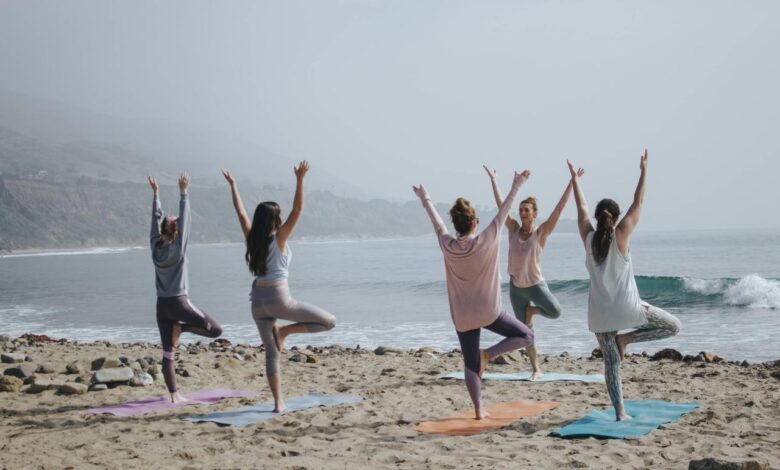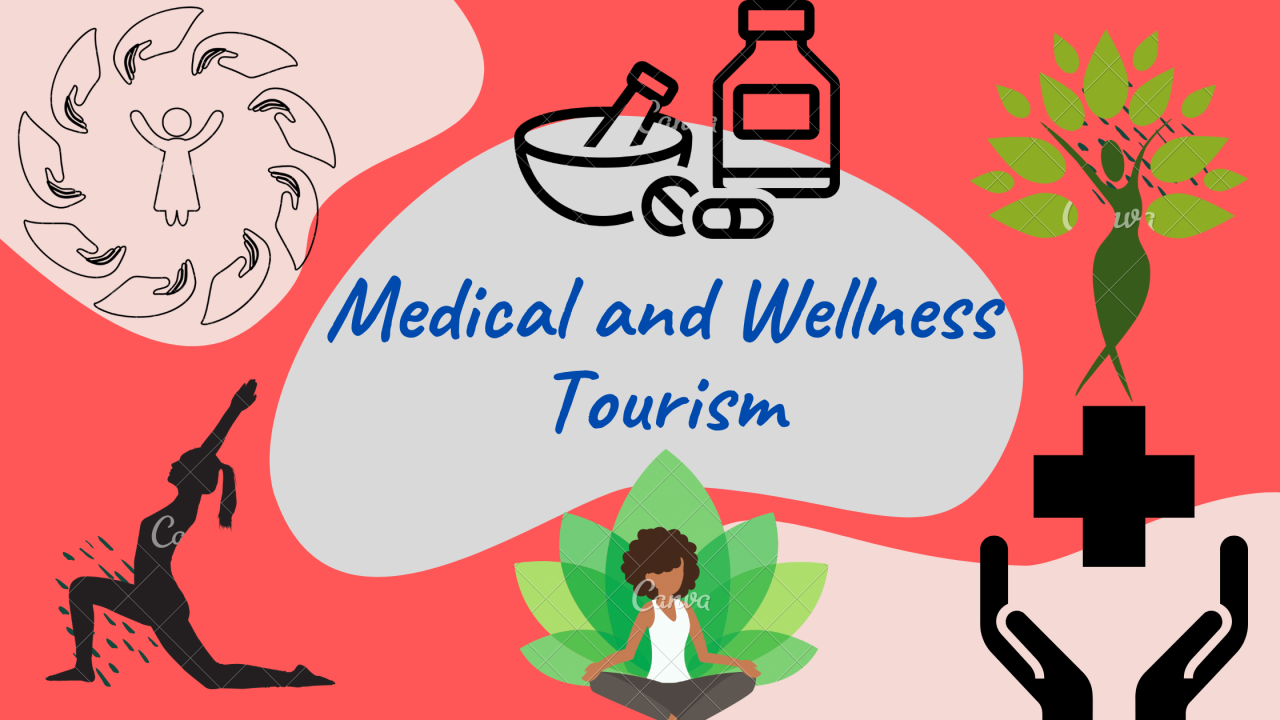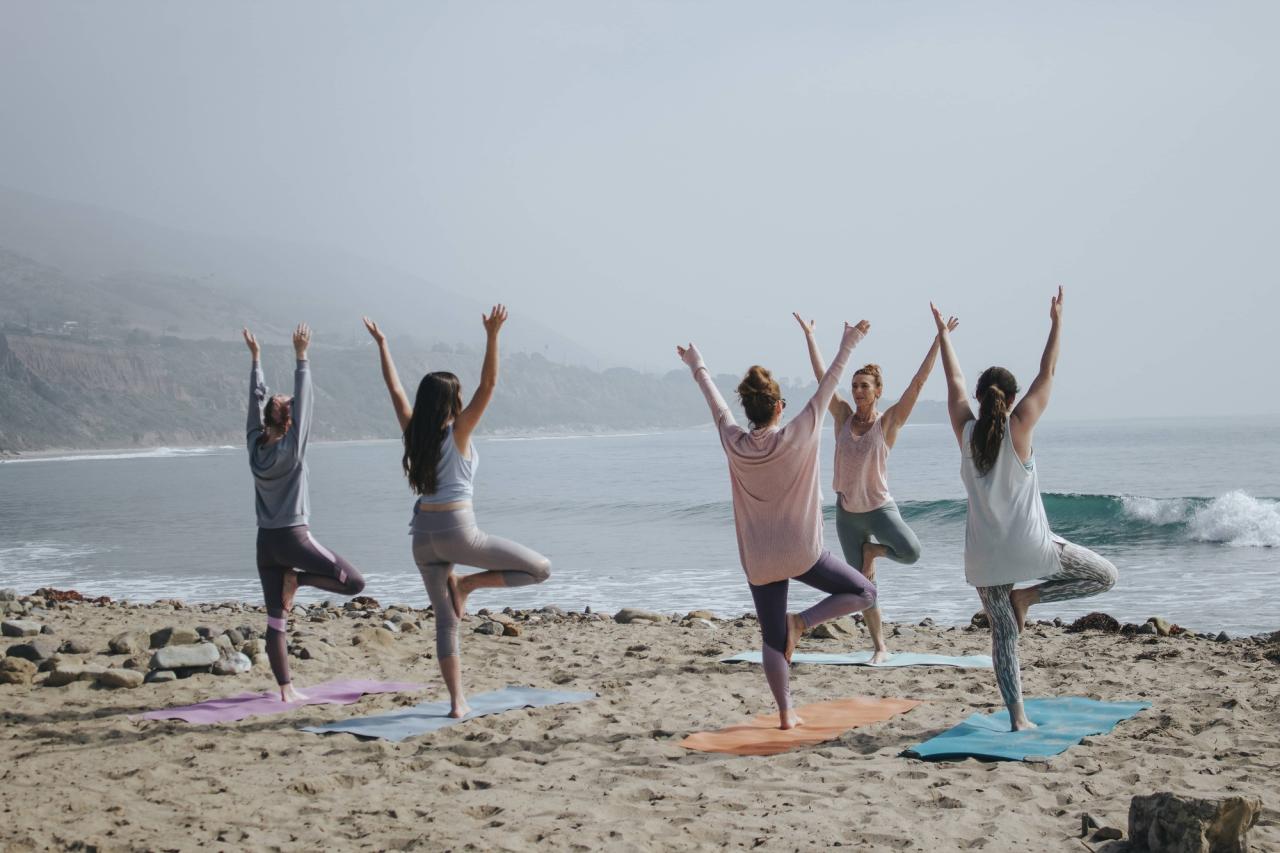
Brain health wellness tourism is emerging as a powerful new force in the travel industry, offering unique experiences designed to enhance cognitive function and mental well-being. This burgeoning sector goes beyond traditional wellness retreats, delving into specialized activities and programs aimed at optimizing brain health. From mindfulness practices to cognitive enhancement workshops, these destinations cater to a growing desire for holistic well-being.
This exploration covers everything from defining brain health wellness tourism and highlighting key characteristics to identifying popular destinations and their unique amenities. We’ll also delve into the experiences, activities, and supporting infrastructure, as well as marketing strategies, ethical considerations, and future trends within this dynamic field.
Defining Brain Health Wellness Tourism
Brain health wellness tourism is a burgeoning segment of the broader wellness tourism industry, focusing specifically on activities and experiences designed to enhance cognitive function, memory, and overall mental well-being. It differs from general wellness tourism by emphasizing strategies and practices aimed directly at the brain, not just the body. This niche caters to individuals seeking to optimize their cognitive abilities, manage stress, and improve their overall quality of life through targeted interventions.This form of tourism offers a variety of experiences, moving beyond the traditional spa treatments to incorporate activities that actively stimulate and challenge the brain.
It’s not simply about relaxation; it’s about engaging in experiences that improve cognitive function, promote mental clarity, and reduce stress.
Key Characteristics of Brain Health Wellness Tourism
Brain health wellness tourism distinguishes itself from general wellness tourism by its unique focus on cognitive enhancement. It emphasizes activities that directly impact the brain, promoting memory, focus, and mental well-being. This is achieved through a combination of mind-body practices, cognitive exercises, and engaging experiences designed to stimulate the brain.
Types of Activities and Experiences, Brain health wellness tourism
This type of tourism offers a range of activities and experiences tailored to different interests and needs. These include:
- Cognitive Stimulation Programs: These programs often incorporate memory exercises, puzzles, and brain games, designed to challenge and improve cognitive functions. Examples include memory training workshops, problem-solving activities, and interactive simulations.
- Mindfulness and Meditation Retreats: These retreats emphasize techniques like mindfulness and meditation, which have been scientifically linked to improved focus, reduced stress, and enhanced emotional regulation. Participants may learn specific techniques and participate in guided meditations to achieve a deeper sense of mental clarity.
- Creative Arts and Expression Workshops: Engaging in creative activities such as painting, writing, or music can stimulate different parts of the brain, promoting cognitive flexibility and emotional expression. Participants can explore their creativity and experience the mental benefits of artistic expression.
- Nature-Based Activities: Spending time in nature, engaging in activities like hiking or birdwatching, can positively impact brain health by reducing stress, improving focus, and enhancing overall well-being. The beauty and tranquility of nature provide a restorative environment for cognitive function.
- Neurofeedback Training: This technique involves monitoring brainwave activity and providing real-time feedback to participants, enabling them to regulate their brainwaves and improve focus and attention. This can help individuals learn self-regulation strategies to improve cognitive function.
Target Audience
The target audience for brain health wellness tourism is diverse, encompassing individuals seeking to enhance cognitive abilities, manage stress, or improve their overall quality of life. This includes professionals under pressure, individuals experiencing cognitive decline, or those simply looking to improve mental well-being.
Key Differences Between Brain Health and General Wellness Tourism
| Characteristic | Brain Health Wellness Tourism | General Wellness Tourism |
|---|---|---|
| Focus | Cognitive enhancement, memory improvement, stress management, and mental well-being. | Physical and mental well-being, stress reduction, relaxation, and overall health improvement. |
| Activities | Memory exercises, brain games, mindfulness, creative arts, neurofeedback, nature-based activities. | Spa treatments, yoga, meditation, hiking, healthy cuisine, and relaxation activities. |
| Target Audience | Individuals seeking to optimize cognitive function, manage stress, or improve mental well-being. | Individuals seeking relaxation, rejuvenation, and physical well-being. |
| Expected Outcomes | Improved memory, focus, attention span, and mental clarity. | Reduced stress, improved sleep, increased energy levels, and physical fitness. |
Destination Profiles
Brain health wellness tourism is rapidly gaining traction, attracting individuals seeking holistic approaches to cognitive well-being. This burgeoning sector offers a range of destinations tailored to specific needs, from stress reduction and memory enhancement to improved focus and creativity. Destinations are leveraging unique natural environments, cultural experiences, and specialized therapies to cater to this growing demand.
Emerging Destinations
Numerous locations globally are emerging as popular destinations for brain health wellness tourism. These locations often possess unique attributes that contribute to their appeal, such as access to natural resources, cultural richness, and a supportive atmosphere. This trend is driven by a rising awareness of the interconnectedness between physical and mental well-being.
Amenities and Facilities
Destinations specializing in brain health wellness tourism offer a variety of amenities and facilities to support various aspects of cognitive function. These often include specialized therapies, mind-body programs, and access to natural environments conducive to relaxation and rejuvenation. For example, a destination might feature meditation centers, yoga studios, or access to scenic trails for mindfulness practices. Nutritional counseling and culinary experiences aligned with brain health are also increasingly common.
Destination Comparisons
Different destinations cater to diverse needs and preferences. For instance, locations nestled in mountainous regions often emphasize the restorative power of nature, while coastal retreats might focus on the calming influence of the ocean. Destinations that integrate cultural immersion often feature activities like traditional arts and crafts, fostering creativity and connection. The selection of activities is influenced by the unique characteristics of the location.
Unique Selling Points
Each destination has unique selling points that attract specific target demographics. Some destinations might emphasize the therapeutic benefits of specific natural elements, while others might highlight the cultural richness and unique experiences available. The combination of natural surroundings, curated activities, and personalized support creates a holistic approach to brain health and wellness.
Destination Profiles Table
| Destination | Unique Offerings | Target Demographic |
|---|---|---|
| Iceland | Access to geothermal spas, glaciers, and Northern Lights experiences, promoting stress reduction and mindfulness. | Individuals seeking rejuvenation and stress relief, with an interest in natural therapies and adventure. |
| Costa Rica | Immersive nature experiences, yoga retreats, and holistic therapies, offering a connection with nature and relaxation. | Individuals seeking a balance of nature, mindfulness, and relaxation, interested in holistic well-being. |
| Kyoto, Japan | Traditional tea ceremonies, Zen gardens, and cultural immersion experiences promoting focus, meditation, and creativity. | Individuals seeking a unique cultural experience, interested in mindfulness, creativity, and exploring ancient traditions. |
| The Swiss Alps | Scenic hiking trails, meditation retreats, and access to alpine air, offering mental clarity and stress relief. | Individuals seeking mental clarity, seeking nature-based therapies, and who enjoy outdoor activities. |
Experiences and Activities

Brain health wellness tourism offers a unique opportunity to engage in activities that nurture cognitive function and mental well-being. These experiences are carefully crafted to foster a sense of rejuvenation and empowerment, promoting lasting positive impacts on individuals’ overall health and quality of life. From mindfulness practices to brain-stimulating challenges, these curated programs offer a transformative journey toward a healthier mind.These experiences go beyond simple relaxation; they are designed to actively engage the mind and body in ways that promote neuroplasticity, the brain’s ability to reorganize itself by forming new neural connections throughout life.
This principle is the cornerstone of many brain health wellness programs.
Mindfulness and Meditation Programs
Mindfulness and meditation practices are integral to promoting mental clarity and emotional regulation. These programs often involve guided sessions, breathwork exercises, and mindful movement, creating a space for participants to connect with their inner selves and reduce stress. Regular practice can improve focus, reduce anxiety, and enhance emotional resilience. The principles behind these programs are rooted in ancient contemplative traditions, yet adapted for modern lifestyles.
Scientific research demonstrates the positive impact of mindfulness on brain function, including reduced activity in the amygdala (the brain region associated with fear and stress) and increased activity in the prefrontal cortex (responsible for executive functions like planning and decision-making).
Cognitive Enhancement Workshops
Cognitive enhancement workshops offer a variety of stimulating activities designed to improve memory, focus, and problem-solving skills. These workshops may incorporate puzzles, brain games, memory exercises, and other activities to challenge the mind and encourage the formation of new neural pathways. The methodology often involves a combination of structured learning, interactive exercises, and personalized feedback. These workshops can significantly improve cognitive function, particularly for individuals seeking to enhance their mental acuity and performance.
Brain health wellness tourism is booming, offering unique retreats focused on mindfulness and rejuvenation. It’s fascinating to see how these destinations are catering to a growing need for holistic well-being. For instance, the recent flurry of activity in the Broadway scene, like the last five years broadway opening , highlights a similar trend of innovation and excitement in other creative sectors.
Ultimately, this reflects a broader societal shift towards prioritizing mental and physical health, something brain health wellness tourism directly addresses.
Neurofeedback and Biofeedback Treatments
Neurofeedback and biofeedback treatments utilize technology to provide real-time feedback on brainwave activity and physiological responses. Participants wear sensors that monitor their brainwaves, heart rate, or other physiological indicators. The feedback allows them to learn to consciously regulate these responses, leading to improved focus, reduced anxiety, and stress management. This approach utilizes the principles of neuroplasticity to train the brain to self-regulate.
Brain-Training Apps and Programs
Brain-training apps and programs are becoming increasingly popular for cognitive enhancement. These applications often use game-like formats to challenge cognitive skills, engaging users in tasks that promote memory, attention, and problem-solving. The methodology typically involves progressive difficulty, personalized learning paths, and tracking of progress. The integration of technology provides a flexible and convenient way to incorporate brain training into daily routines.
Table: Brain Health Wellness Experiences and Associated Benefits
| Experience | Associated Benefits |
|---|---|
| Mindfulness and Meditation Programs | Improved focus, reduced stress, enhanced emotional regulation, increased self-awareness |
| Cognitive Enhancement Workshops | Improved memory, focus, problem-solving skills, enhanced cognitive function |
| Neurofeedback and Biofeedback Treatments | Improved focus, reduced anxiety, stress management, self-regulation skills |
| Brain-Training Apps and Programs | Improved memory, attention, problem-solving skills, cognitive enhancement |
Supporting Infrastructure and Services
Brain health wellness tourism isn’t just about picturesque destinations; it requires a robust infrastructure to support the unique needs of its visitors. From specialized healthcare facilities to educational programs, a comprehensive ecosystem is crucial for a successful and enriching experience. This infrastructure fosters a holistic approach to well-being, empowering travelers to actively engage in their own journey towards optimal brain function.
Essential Healthcare Facilities
Providing access to qualified medical professionals is paramount in brain health wellness tourism. This includes neurologists, psychiatrists, and therapists specializing in cognitive enhancement and mental well-being. A range of diagnostic services, including neuropsychological testing and brain imaging, should be readily available. The availability of emergency medical services is also critical for a safe and secure environment.
Brain health wellness tourism is a fantastic way to rejuvenate and reconnect with yourself. Looking for the perfect gift for Mom this Mother’s Day? Consider experiences that promote well-being, like a retreat focusing on mindfulness and healthy eating. A spa package or a weekend getaway centered around brain health wellness tourism could be the ideal present for the special woman in your life, and check out some amazing gift ideas at best mothers day gifts.
These experiences will not only nourish her mind but also her body, setting her up for continued wellness and relaxation.
Educational Resources and Programs
To truly enhance the visitor experience, a variety of educational resources are vital. This includes workshops, seminars, and interactive sessions focused on brain health, nutrition, mindfulness, and stress management techniques. These programs should be tailored to various learning styles and needs, encompassing both individual and group settings. Local universities and research institutions can play a significant role in offering these resources.
Accommodation Options
Accommodation options must be carefully considered to support the needs of brain health wellness tourists. This includes lodging facilities that offer a tranquil and conducive environment for relaxation and introspection. Consideration should be given to amenities like quiet rooms, comfortable spaces for personal reflection, and access to natural light and fresh air. Some accommodations might even incorporate elements of nature therapy to promote mental well-being.
Local Community Involvement
The success of brain health wellness tourism hinges on the active participation of local communities. This includes collaborating with local businesses, creating employment opportunities for locals, and supporting the preservation of local traditions and culture. Involving local artisans and chefs can also enrich the experience and provide an authentic connection with the destination. By supporting the local community, the tourism model can become sustainable and beneficial for everyone.
Regulations and Policies
Clear regulations and policies are essential to ensure the ethical and responsible development of brain health wellness tourism. These policies should address issues such as data privacy, the qualifications of healthcare providers, and the standards for educational programs. Transparency and accountability are crucial to maintaining public trust and confidence. Regulations should also address potential conflicts of interest within the industry.
Essential Services and Amenities
| Category | Essential Services/Amenities |
|---|---|
| Healthcare | Neurologists, Psychiatrists, Psychologists, Neuropsychological testing, Brain imaging, Emergency medical services, Pharmacy |
| Education | Workshops on brain health, Nutrition, Mindfulness, Stress management, Group and individual sessions, Educational materials |
| Accommodation | Quiet rooms, Comfortable spaces for reflection, Natural light and fresh air, Nature therapy options, Access to quiet areas |
| Community Engagement | Local businesses involved, Employment opportunities for locals, Preservation of local culture, Support for local artisans and chefs |
| Regulations | Data privacy policies, Healthcare provider qualifications, Educational program standards, Conflict of interest policies |
Marketing and Promotion Strategies: Brain Health Wellness Tourism
Brain health wellness tourism presents a unique opportunity for destinations to attract discerning travelers seeking holistic well-being. Effective marketing and promotion strategies are crucial for showcasing the unique offerings and attracting this target audience. A strong brand identity and targeted digital campaigns are essential for success in this competitive market.
Branding and Positioning
Establishing a strong brand identity is paramount in the brain health wellness tourism sector. Destinations should clearly define their unique selling proposition (USP), emphasizing the specific brain-boosting experiences and resources they offer. This includes highlighting the quality of facilities, the expertise of practitioners, and the overall atmosphere conducive to mental rejuvenation. A well-defined brand will resonate with potential travelers, building trust and recognition.
For example, a destination focused on mindfulness retreats might emphasize tranquility and inner peace in its branding, while a destination specializing in cognitive enhancement might emphasize scientific rigor and cutting-edge techniques.
Digital Marketing Strategies
Digital marketing plays a critical role in reaching potential brain health wellness tourists. Destinations should leverage search engine optimization () to ensure their websites and relevant content rank highly in search results. Targeted online advertising campaigns on platforms like Google Ads and social media can reach specific demographics interested in brain health and wellness. Creating engaging content on social media platforms like Instagram, Facebook, and YouTube is crucial for showcasing experiences, testimonials, and the destination’s unique charm.
Interactive content, like webinars or online Q&A sessions with experts, can attract and engage potential customers.
Social Media Platforms
Social media platforms are powerful tools for showcasing the destination’s offerings. Consistent posting of high-quality images and videos of the destination’s facilities, experiences, and testimonials can foster excitement and interest. Live streaming events and interactive Q&A sessions with wellness experts can create a sense of community and authenticity. Using relevant hashtags and engaging with potential customers through comments and messages can further amplify reach and visibility.
Partnering with influencers who align with the destination’s brand and target audience can expand its reach and credibility.
Marketing Strategies and Potential Impact
| Marketing Strategy | Potential Impact |
|---|---|
| Search Engine Optimization () | Increased organic traffic to website, higher visibility in search results. |
| Targeted Online Advertising | Increased brand awareness, reaching specific demographics, driving website traffic and bookings. |
| Social Media Marketing | Enhanced brand visibility, engagement with potential customers, fostering a sense of community, increasing website traffic and bookings. |
| Content Marketing (blog posts, articles, videos) | Establishing expertise, attracting organic traffic, building trust and credibility with potential customers. |
| Influencer Marketing | Increased brand reach, enhanced credibility through endorsements, driving traffic to the destination and increasing bookings. |
Sustainability and Ethical Considerations
Brain health wellness tourism, while offering incredible potential for personal growth and community development, needs to be approached with a strong emphasis on sustainability and ethical considerations. Ignoring these factors can lead to environmental damage, exploitation of local communities, and compromised client well-being. A responsible approach to this burgeoning sector ensures long-term benefits for both tourists and the destinations they visit.Responsible tourism practices are not just about preserving the environment; they encompass respecting local cultures, supporting local economies, and ensuring ethical treatment of all involved.
By prioritizing sustainability and ethical considerations, we can transform brain health wellness tourism into a truly beneficial experience for everyone.
Brain health wellness tourism is all about prioritizing mental well-being while traveling. It’s a fascinating concept, and I’m particularly drawn to how it’s becoming increasingly popular. To be honest, I find myself constantly drawn to the wealth of knowledge and inspiration found on BookTok, which helps me learn more about various wellness approaches, and I’m not letting it go! why i wont quit booktok This is influencing my research into the best ways to maintain a healthy brain, even while exploring new destinations.
Ultimately, combining brain health wellness tourism with creative inspiration is a perfect way to unwind and learn.
Environmental Impact and Mitigation Strategies
The influx of tourists for brain health retreats can significantly impact local ecosystems. Increased energy consumption, waste generation, and water usage are common concerns. Furthermore, transportation requirements for tourists can contribute to carbon emissions.
- Minimizing Transportation Impacts: Promoting sustainable transportation options like cycling, walking, and electric vehicles within the destination can significantly reduce carbon footprints. Offering incentives for tourists to choose these methods, and encouraging the use of public transportation where available, are crucial steps.
- Waste Management and Recycling: Implementing robust waste management systems, including comprehensive recycling programs, is essential. Educating tourists about proper waste disposal and providing clear guidelines about recycling options can significantly reduce waste generation.
- Water Conservation: Implementing water-efficient practices in accommodations and wellness centers is crucial. This includes using low-flow fixtures, promoting water-saving techniques, and utilizing rainwater harvesting where feasible.
- Energy Efficiency: Promoting energy-efficient buildings and appliances in accommodations and wellness centers can reduce energy consumption. Investing in renewable energy sources, like solar panels, can further minimize the environmental impact.
Ethical Considerations in Service Provision
Ethical considerations in brain health wellness tourism extend beyond environmental concerns. The well-being of clients and the integrity of the services offered must be paramount. Transparency, informed consent, and appropriate qualifications of practitioners are key elements.
- Client Well-being: Prioritizing client well-being involves ensuring that all services are provided in a safe and ethical manner. It is crucial to have clear communication protocols, informed consent forms, and mechanisms for client feedback and grievance resolution.
- Practitioner Qualifications: Ensuring that practitioners are adequately qualified and trained in the specific brain health techniques offered is essential. Clear licensing and certification requirements should be in place to guarantee competence and ethical standards.
- Cultural Sensitivity: Understanding and respecting the local culture is vital. Wellness tourism should not impose foreign practices on local communities without proper consultation and understanding. Respecting cultural norms and traditions is essential for creating a positive and mutually beneficial experience.
Responsible Tourism and Cultural Preservation
Responsible tourism practices are crucial for preserving destinations’ cultural heritage. These practices involve supporting local communities, promoting cultural exchange, and ensuring that tourism benefits the local economy rather than harming it.
- Supporting Local Businesses: Encouraging tourists to patronize locally owned businesses, including accommodations, restaurants, and shops, can generate revenue for local communities and foster economic empowerment. Local guides and artisans can benefit from increased tourism and sales.
- Promoting Cultural Exchange: Creating opportunities for tourists to learn about and engage with local cultures can foster respect and understanding. This includes offering cultural experiences, workshops, and educational programs.
- Protecting Cultural Heritage: Promoting responsible tourism practices, including limiting the impact of tourism on sensitive sites and promoting conservation efforts, can ensure that cultural heritage is preserved for future generations.
Sustainable Initiative Example: The “Mindful Mountains” Retreat
The “Mindful Mountains” retreat in the Himalayas exemplifies a sustainable brain health wellness tourism initiative. It focuses on eco-friendly practices, such as utilizing solar energy and rainwater harvesting. The retreat employs local guides and artisans, creating employment opportunities and supporting the local economy. They also offer workshops on local flora and fauna, promoting cultural awareness and appreciation among tourists.
This example highlights how sustainable practices can be integrated into brain health wellness tourism to create a positive impact on both tourists and the environment.
Future Trends and Developments
Brain health wellness tourism is poised for significant growth, driven by increasing awareness of the importance of cognitive well-being. This evolution will be fueled by innovative technologies and approaches, creating unique experiences for travelers seeking holistic mind-body rejuvenation. This burgeoning sector will necessitate strategic collaborations between diverse stakeholders to ensure sustainable and ethical development.The future of brain health wellness tourism will be shaped by advancements in technology and a greater emphasis on personalized experiences.
Expect to see a shift from generalized programs to tailored interventions, reflecting individual needs and preferences. This trend will also encourage partnerships between wellness providers, technology companies, and destination management organizations.
Emerging Technologies
Technological advancements are revolutionizing how we understand and support brain health. Virtual reality (VR) and augmented reality (AR) are transforming the delivery of cognitive training programs, offering immersive and engaging experiences. AI-powered assessments are enabling personalized interventions, pinpointing specific cognitive strengths and weaknesses. Biofeedback technologies are empowering individuals to monitor and regulate their physiological responses, fostering greater self-awareness and control over their brain health.
Furthermore, wearable sensors are becoming increasingly sophisticated in tracking brain activity, providing valuable data for personalized interventions and therapeutic monitoring.
Innovative Approaches
Beyond technology, innovative approaches are emerging that prioritize the integration of mind-body wellness. Neuro-nutritional programs are gaining popularity, emphasizing the crucial role of diet and supplementation in supporting cognitive function. Mindfulness-based therapies and meditation retreats are expanding, offering structured programs to cultivate mental clarity and resilience. Experiential learning environments are emerging, providing opportunities to integrate physical activity, creative pursuits, and social interaction with cognitive exercises.
Brain-healthy cuisine is gaining traction, focusing on dietary strategies that promote optimal cognitive performance.
Collaboration and Partnerships
The future of brain health wellness tourism depends on successful collaborations among various stakeholders. Destinations need to collaborate with wellness providers, technology companies, and researchers to offer cutting-edge programs and experiences. Partnerships between wellness resorts and universities can facilitate research and development, leading to innovative approaches. Strong collaborations with local communities ensure the sustainability and cultural sensitivity of these initiatives.
These alliances can also support the creation of a global network of destinations dedicated to brain health wellness tourism.
Potential Future Developments and Trends
| Category | Potential Future Development/Trend | Description |
|---|---|---|
| Technology | Personalized Brain Training Apps | Mobile applications will offer customized cognitive training programs based on individual needs and progress. |
| Experiences | Neuro-Gastronomy Tours | Culinary experiences focused on brain-healthy foods, paired with cognitive stimulation activities. |
| Partnerships | Global Certification for Brain Health Wellness Tourism Professionals | Establishing a standard for professionals in the field, ensuring quality and expertise. |
| Sustainability | Eco-Conscious Brain Wellness Resorts | Destinations committed to minimizing environmental impact through sustainable practices. |
Final Wrap-Up

In conclusion, brain health wellness tourism presents a fascinating and evolving landscape of opportunities for both travelers and destinations. It’s a sector poised for growth, driven by a global emphasis on mental well-being and the search for innovative ways to optimize cognitive function. As this field develops, we can expect even more specialized offerings and a greater focus on sustainable and ethical practices.
The future of brain health wellness tourism promises to be one of innovation and opportunity.




